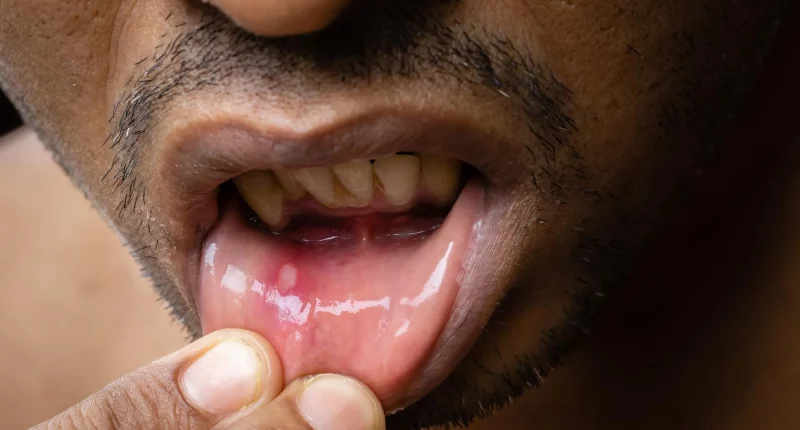Aphthous Stomatitis, also called canker sores. A canker sore is a type of sore inside your mouth, also called a mouth ulcer. Lots of people get them, and they can be painful.
Canker sores can happen to anyone, but they’re more common in younger people and females. Even children 2 years old can get them, but they usually start appearing more in teenagers.
Most people only get canker sores once in a while, but some people get them often, like 3-4 times a year. These are called simple canker sores, and they usually go away in about a week.
There’s another kind called complex canker sores. These are less common but bigger and more painful. They can last up to a month and might leave a scar. These can be a sign of other problems, like a weak immune system, Crohn’s disease, or not getting enough vitamins.
Causes
Researchers are still figuring out why canker sores happen, but they know a few things that might be involved, like getting a viral infection.
If you keep getting canker sores over and over again, called recurrent canker sores, it’s not entirely clear why. But sometimes, it might run in your family or be related to allergies.
Sometimes, canker sores can show up along with other health problems that need a doctor’s attention, like bowel issues, allergies, weak immunity, or not getting enough nutrients.
Here are some things that might play a part in getting canker sores:
- Hormonal changes: Like when your body goes through puberty or during your period.
- Physical injury: If you accidentally hurt the inside of your mouth, like during dental work.
- Certain medicines: Some drugs might make you more likely to get canker sores.
- Food allergies: Some people might notice that certain foods like tomatoes or citrus fruits make their canker sores worse.
- Not enough nutrients: If your body lacks stuff like folic acid, iron, vitamin B12 or zinc, it could lead to canker sores.
- Stress: Feeling stressed out might make you more likely to get canker sores.
In the U.S., about a quarter of people deal with recurrent canker sores, and it might be even more common in certain groups, like students studying to be doctors or nurses.
Symptoms
Canker sores can be painful and easily irritated, causing discomfort in the mouth. The pain itself can become frustrating for some people dealing with these ulcers. Typically, canker sores are characterized by specific features:
- They are round, well-defined, and usually smaller than a centimeter, appearing shallow on the mucosal surface (the lining of the mouth).
- Sometimes, there might be a tingling feeling before the sore actually appears.
- They often have a yellow-gray or white center surrounded by a red, inflamed margin, which may fade to gray as the sore heals.
- Canker sores are commonly found in the front area of the mouth, on the floor of the mouth, inside the lip and cheeks (labial mouth and buccal), or under the tongue, and occasionally on the gums or at the back of the mouth.
- Typically, they last about 7-14 days before healing.
In more serious cases, canker sores may be accompanied by other symptoms, such as feeling tired, swollen lymph nodes, or high temperatures of a body. These additional symptoms are less common but can occur in some individuals with more severe outbreaks.
Canker sores vs cold cores
Canker sores and cold sores are not the same thing:
Canker sores look like white circles with a red ring around them, while cold sores are usually filled with fluid.
Canker sores show up inside your mouth, but cold sores show up outside, frequently under your nose and chin, around your lips.
You can’t spread canker sores to others, but cold sores are happened by a virus called herpes simplex (HSV), which can be contagious.
When to consult a doctor
For most people, regular canker sores go away on their own without needing a doctor’s help. But if you have serious or keep getting them again and again, a doctor might give you some treatments to help with the pain. These treatments can make you feel better, but they won’t make the sores disappear forever.
Here’s when you should think about seeing a dentist or doctor:
- If your canker sores don’t get better after 2 weeks.
- If they keep getting worse, even if you’re trying home remedies.
- If you keep getting them often, like 2-3 times a year, or if they’re really bad.
- If you have other symptoms with your canker sores, like a fever, upset stomach, headache, or rash.
- If you think your canker sores might be related to another health problem you have.
Treatment
Treatment for canker sores can help ease the discomfort and pain they cause. There are different options you can try, whether you get them once in a while or more often.
For simple cases of canker sores that pop up every now and then, they usually go away on their own without needing any special treatment. Most treatments available, whether you need a prescription or not, mainly focus on making you feel better by reducing pain and discomfort.
It’s essential to know that not many treatments for canker sores have been thoroughly tested in clinical trials. So, when it comes to managing canker sores, the goal is to treat the symptoms, like reducing swelling and helping the sores heal faster. This is because if they’re left untreated, they might get infected, which can make them take even longer to go away.
Some treatments your doctor might suggest include special mouth rinses with steroids, numbing creams you can put on the sore, rinses or ointments with antiseptic properties, or even taking certain vitamins or minerals that could help.
Home remedies
Home remedies that can help ease the pain and promote healing. One suggested remedy from the U.S. Library of Medicine involves rinsing your mouth with salt water or mild mouthwash a few times in a day, being careful not to swallow. You can also make a mix of half water and half hydrogen peroxide apply it directly to the sore using a cotton swab. Another option is dabbing a bit of milk of magnesia on the sore. Additionally, other therapies like sucking on zinc gluconate lozenges or taking vitamin B complex, vitamin C, and lysine orally at the onset of sores might help speed up healing, although these haven’t been extensively studied. Chamomile and Sage mouthwash or drinking celery, carrot, and cantaloupe juices have also been reported as potentially helpful, although more research is needed to confirm their effectiveness.
Prescription therapy
In more serious or long-lasting instances of canker sores, it’s important to see a doctor for proper evaluation to rule out any related conditions and to explore suggested treatments if necessary. While treatments aimed directly at the sores might not completely modify their course, they can help alleviate symptoms. Antibiotics might be recommended to reduce inflammation, regardless of whether there’s a bacterial infection. Anesthetics, available in over-the-counter products or as recommended topical preparations, can also help manage pain and irritation.
Some medications originally intended for other conditions, such as cortisone, may be recommended to suppress an overactive immune system, which can contribute to recurrent canker sores. These might include locally applied topical corticosteroids or cortisone-like dexamethasone rinse, clobetasol ointment, or fluocinonide gel (Lidex), although they could potentially lead to fungal infections in the mouth as a side effect. In severe or frequent cases, an oral specialist might be consulted for systemic medications instead of just topical treatments. These doctors might also help with a more particular diagnosis, as some infrequent cases of recurrent canker sores may have different underlying causes like Sutton disease.
Prevention
It’s not entirely clear how to stop canker sores from happening in the first place, but there are things you can do to keep them from getting worse or feeling more painful.
To prevent making canker sores worse, try avoiding:
- Foods that are rough or can stick in your mouth, like potato chips.
- Acidic, spicy, or hot drinks and foods.
- Being rough with your mouth, like brushing too hard with a toothbrush.
Summary
Canker sores are common mouth ulcers that often heal on their own but can be managed with treatments to reduce pain and discomfort. Home remedies like rinsing with salt water or using hydrogen peroxide mixtures may help. In more severe cases, prescription treatments like antibiotics or corticosteroids may be needed.
Prevention involves avoiding irritating foods and being gentle with your mouth. While the exact cause of canker sores is unclear, factors like hormonal changes, physical trauma, and stress may play a role. Seeing a doctor is recommended if canker sores persist, worsen, or are accompanied by other symptoms.








